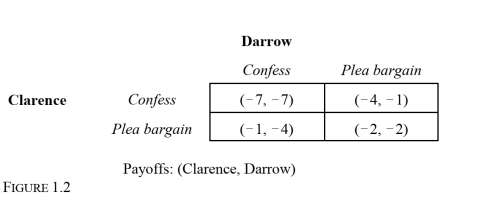Multiple Choice

-Consider the one-time, noncooperative, static game depicted in Figure 1.2. Which player has a strictly dominant strategy?
A) Clarence
B) Darrow
C) Both players
D) Neither player
E) Cannot be answered without additional information.
Correct Answer:

Verified
Correct Answer:
Verified
Q1: The modern version of the game theory
Q2: Players in simultaneous-move games with complete information
Q3: <img src="https://d2lvgg3v3hfg70.cloudfront.net/TBR1330/.jpg" alt=" -Refer to Figure
Q4: In a simultaneous-move game:<br>A) The players move
Q5: <img src="https://d2lvgg3v3hfg70.cloudfront.net/TBR1330/.jpg" alt=" -Refer to Figure
Q7: An assumption about static games with complete
Q8: An example of a simultaneous-move game is:<br>A)
Q9: <img src="https://d2lvgg3v3hfg70.cloudfront.net/TBR1330/.jpg" alt=" -Consider the advertising
Q10: The prisoner's dilemma describes a strategic situation
Q11: <img src="https://d2lvgg3v3hfg70.cloudfront.net/TBR1330/.jpg" alt=" -Consider the pricing